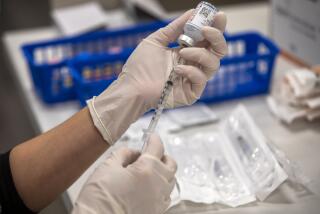AIDS Vaccine Efforts a Big Boost for Stock : Biotechnology: Approval for Immune Response’s treatment is still years off, but the company’s shares are benefiting now.
- Share via
Even in the high-profile biotechnology industry, Immune Response Corp. of Carlsbad stands out these days.
The 5-year-old company’s stock is possibly the hottest biotechnology issue on the market, having zoomed on the strength of investor interest in its human immunodeficiency virus (HIV) therapeutic vaccine that is in advanced stages of clinical trials.
Immune Response shares climbed from a January low of $2.875 to close Monday at $32.25 in over-the-counter trading. The company took advantage of its rich and rising stock price to recently file for permission to sell 1 million more shares to the public, an offering that could raise more than $32 million.
Immune Response’s HIV therapeutic vaccine is based on an approach conceived by Jonas Salk, a founding director of the company and chairman of its scientific advisory board. In clinical testing since 1987, the vaccine is further along the approval pipeline than any other comparable treatment for acquired immune deficiency syndrome, said Jim McCamant, editor of the Medical Technology Stock Letter based in Berkeley.
McCamant and other analysts stress that there is no guarantee that Immune Response’s vaccine will ultimately clear the federal Food and Drug Administration’s testing and approval hurdles, which, if all goes well, could take another two years at minimum.
Nevertheless, Immune Response’s vaccine is months ahead of treatments being developed by other companies, including competitors such as Genentech, Chiron and MicroGensys, said Robert Kupor, a biotechnology analyst with Kidder, Peabody & Co. of New York. And Immune Response’s innovative approach to treating AIDS is rapidly gaining respectability after initially attracting little but scorn.
Kupor said Immune Response’s treatment “has become very much more respectable. The verdict is absolutely still out; nobody really knows whether it will work or not. But whereas everyone at first thought it was ludicrous, now people say there might be something to it.” Moreover, Kupor believes that Immune Response’s vaccine technique is patentable, a valuable attribute in an increasingly litigious industry.
McCamant said the stock market is quick to support companies pursuing a possible AIDS breakthrough and is obviously encouraged that Immune Response has a clear lead over competition.
“Immune Response is furthest along in their clinical trials, so that’s a matter of time priority, an easy thing for investment people to judge,” McCamant said. “The potential efficacy of the vaccine versus other things is hard to judge and I’m inclined to believe it might not be the best solution to AIDS. But the fact they are ahead is very important for the investment community.”
The stock’s advance is partially explained by the rise in biotechnology stocks in general, which are up more than 60% since the start of the year, McCamant said. Biotechnology stocks overall have benefited from investors’ perceptions that companies are finally delivering on years of research and promises, McCamant said.
The brightest star in the biotechnological constellation is Amgen of Thousand Oaks, which is expected to soon become the first biotechnology firm with revenues high enough to qualify it for the Fortune 500 list of top U. S. manufacturers.
But Immune Response has its own story to tell these days, one that is attracting an increasing number of listeners. The story revolves around Immune Response’s method of injecting a “killed-virus” vaccine into patients who recently have been infected by the HIV virus and whose disease has not developed into full-blown AIDS.
The approach initially proposed by Salk, discoverer of the first polio vaccine, involves a vaccine that is in fact an AIDS virus whose outer protective “envelope” has been stripped away with chemicals and whose inner core has been inactivated with radiation. The result: a vaccine the company purports will stimulate a patient’s autoimmune system to arrest the viral infection that leads to AIDS.
When Immune Response first announced in 1987 that it was beginning tests on such a vaccine, the company’s technology was openly viewed by the scientific community as farcical, Kupor said, in part because it involved no use of recombinant DNA molecules, an “inelegant” approach.
But the vaccine’s performance in clinical trials, first begun in 1987, has been encouraging. Currently, 100 HIV-positive patients are participating in double-blind, placebo controlled tests with Immune Response’s vaccine at unidentified locations. And so far, the vaccine has caused a “meaningful reduction in the viral burden” of HIV-infected patients treated, according to a favorable investment report by Robertson Stephens & Co. of San Francisco.
Moreover, the report said “no side effects have been observed so far” in patients treated with the Immune Response vaccine, a decided plus in light of the harsh side effects caused by the AIDS treatment AZT. Immune Response officials would not comment on the progress of the vaccine, saying the stock filing restricts their public comments.
The new stock offering follows close on the heels of a $27.5-million secondary stock offering held by the company in April. Immune Response went public with an initial public stock offering in May, 1990. The latest stock sale is being underwritten by Robertson, Stephens & Co. and Montgomery Securities.
Principal shareholders of Immune Response, which was founded in 1986, include Rhone-Poulenc Rorer with a 10.9% stake, State Farm Mutual Automobile Insurance with 10.6% and Colgate-Palmolive with a 6.7% stake. Salk owns less than 1% of Immune Response shares.
So far, the company has raised some $65 million though stock offerings and equity investments, including a $10-million investment by Rhone-Poulenc Rorer, which is Immune Response’s joint venture partner in developing the HIV vaccine. The French firm also pledged to pay Immune Response an additional $15 million as the vaccine achieves certain regulatory milestones.
The company’s only revenues thus far are contract research payments that in 1990 totaled $4.2 million.






